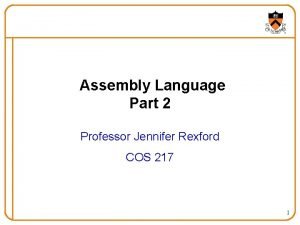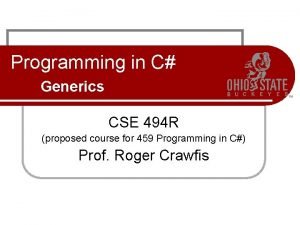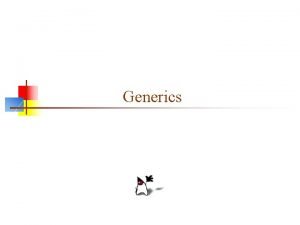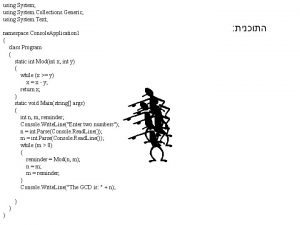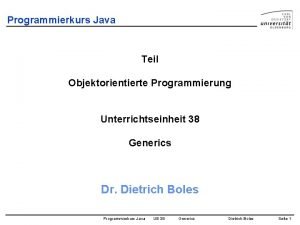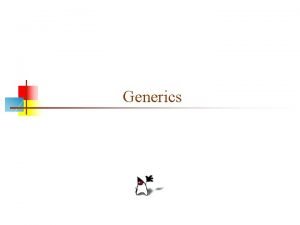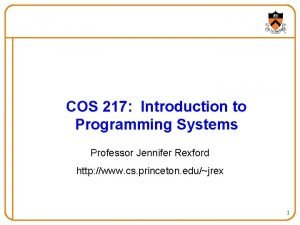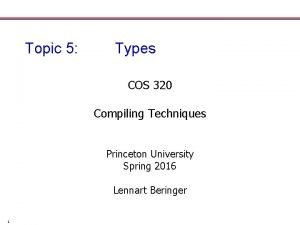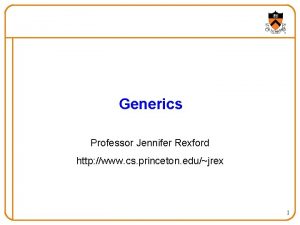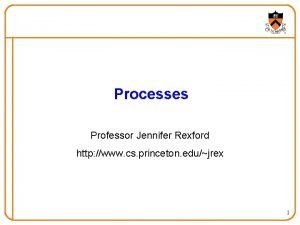Generics Professor Jennifer Rexford http www cs princeton



























- Slides: 27

Generics Professor Jennifer Rexford http: //www. cs. princeton. edu/~jrex 1

Goals of this Lecture • Help you learn about: • Generic modules • Data structures that can store multiple types of data • Functions that can work on multiple types of data • How to create generic modules in C • Which wasn’t designed with generic modules in mind! • Why? • Reusing existing code is easier/cheaper than writing new code; reuse reduces software costs • Generic modules are more reusable than non-generic ones • A power programmer knows how to create generic modules • A power programmer knows how to use existing generic modules to create large programs 2

Generic Data Structures Example • Recall Stack module from last lecture /* stack. h */ typedef struct Stack *Stack_T; Stack_T Stack_new(void); void Stack_free(Stack_T s); void Stack_push(Stack_T s, const char *item); char *Stack_top(Stack_T s); void Stack_pop(Stack_T s); int Stack_is. Empty(Stack_T s); • Items are strings (type char*) 3

Generic Data Structures Example • Stack operations (push, pop, top, etc. ) make sense for items other than strings too • So Stack module could (and maybe should) be generic • Problem: How to make Stack module generic? • How to define Stack module such that a Stack object can store items of any type? 4

Generic Data Structures viatypedef • Solution 1: Let clients define item type /* client. c */ struct Item { char *str; /* Or whatever is appropriate */ }; … Stack_T s; struct Item item; item. str = "hello"; s = Stack_new(); Stack_push(s, item); … /* stack. h */ typedef struct Item *Item_T; typedef struct Stack *Stack_T; Stack_T void Item_T void int Stack_new(void); Stack_free(Stack_T s); Stack_push(Stack_T s, Item_T item); Stack_top(Stack_T s); Stack_pop(Stack_T s); Stack_is. Empty(Stack_T s); 5

Generic Data Structures viatypedef • Problem: Awkward for client to define structure type and create structures of that type • Problem: Client (or some other module in same program) might already use “Item_T” for some other purpose! • Problem: Client might need two Stack objects holding different types of data!!! • We need another approach… 6

Generic Data Structures via void* • Solution 2: The generic pointer (void*) /* stack. h */ typedef struct Stack *Stack_T; Stack_T Stack_new(void); void Stack_free(Stack_T s); void Stack_push(Stack_T s, const void *item); void *Stack_top(Stack_T s); void Stack_pop(Stack_T s); int Stack_is. Empty(Stack_T s); 7

Generic Data Structures via void* • Can assign a pointer of any type to a void pointer /* client. c */ … Stack_T s; s = Stack_new(); Stack_push(s, "hello"); … OK to match an actual parameter of type char* with a formal parameter of type void* /* stack. h */ typedef struct Stack *Stack_T; Stack_T Stack_new(void); void Stack_free(Stack_T s); void Stack_push(Stack_T s, const void *item); void *Stack_top(Stack_T s); void Stack_pop(Stack_T s); int Stack_is. Empty(Stack_T s); 8

Generic Data Structures via void* • Can assign a void pointer to a pointer of any type /* client. c */ char *str; … Stack_T s; s = Stack_new(); Stack_push(s, "hello"); … str = Stack_top(s); OK to assign a void* return value to a char* /* stack. h */ typedef struct Stack *Stack_T; Stack_T Stack_new(void); void Stack_free(Stack_T s); void Stack_push(Stack_T s, const void *item); void *Stack_top(Stack_T s); void Stack_pop(Stack_T s); int Stack_is. Empty(Stack_T s); 9

Generic Data Structures via void* • Problem: Client must know what type of data a void pointer is pointing to /* client. c */ int *i; … Stack_T s; s = Stack_new(); Stack_push(s, "hello"); … i = Stack_top(s); Client pushes a string Client considers retrieved value to be a pointer to an int! Legal!!! Trouble!!! • Solution: None • Void pointers subvert the compiler’s type checking • Programmer’s responsibility to avoid type mismatches 10

Generic Data Structures via void* • Problem: Stack items must be pointers • E. g. Stack items cannot be of primitive types (int, double, etc. ) /* client. c */ … int i = 5; … Stack_T s; s = Stack_new(); … Stack_push(s, 5); … Stack_push(s, &i); Not OK to match an actual parameter of type int with a formal parameter of type void* OK, but awkward • Solution: none • In C, there is no mechanism to create truly generic data structures • (In C++: Use template classes and template functions) • (In Java: Use generic classes) 11

Generic Algorithms Example • Suppose we wish to add another function to the Stack module /* stack. h */ typedef struct Stack *Stack_T; Stack_T Stack_new(void); void Stack_free(Stack_T s); void Stack_push(Stack_T s, const void *item); void *Stack_top(Stack_T s); void Stack_pop(Stack_T s); int Stack_is. Empty(Stack_T s); int Stack_are. Equal(Stack_T s 1, Stack_T s 2); Returns 1 (TRUE) iff s 1 and s 2 are equal, that is, contain equal items in the same order 12

Generic Algorithm Attempt 1 • Attempt 1 /* stack. c */ /* client. c */ … char str 1[] = "hi"; char str 2[] = "hi"; Stack_T s 1 = Stack_new(); Stack_T s 2 = Stack_new(); Stack_push(s 1, str 1); Stack_push(s 2, str 2); int Stack_are. Equal(Stack_T s 1, Stack_T s 2) { return s 1 == s 2; } Returns 0 (FALSE) Incorrect! if (Stack_are. Equal(s 1, s 2)) { … } • Checks if s 1 and s 2 are identical, not equal • Compares pointers, not items • That’s not what we want 13

Addresses vs. Values • Suppose two locations in memory have the same value int i=5; int j=5; i j 5 5 • The addresses of the variables are not the same • That is “(&i == &j)” is FALSE • Need to compare the values themselves • That is “(i == j)” is TRUE • Unfortunately, comparison operation is type specific • The “==“ works for integers and floating-point numbers • But not for strings and more complex data structures 14

Generic Algorithm Attempt 2 • Attempt 2 /* stack. c */ … int Stack_are. Equal(Stack_T s 1, Stack_T s 2) { struct Node *p 1 = s 1 ->first; struct Node *p 2 = s 2 ->first; while ((p 1 != NULL) && (p 2 != NULL)) { if (p 1 != p 2) return 0; p 1 = p 1 ->next; p 2 = p 2 ->next; } if ((p 1 != NULL) || (p 2 != NULL)) return 0; return 1; } • Checks if nodes are identical • Compares pointers, not items • That is still not what we want /* client. c */ char str 1[] = "hi"; char str 2[] = "hi"; Stack_T s 1 = Stack_new(); Stack_T s 2 = Stack_new(); Stack_push(s 1, str 1); Stack_push(s 2, str 2); if (Stack_are. Equal(s 1, s 2)) { … } Returns 0 (FALSE) Incorrect! 15

Generic Algorithm Attempt 3 • Attempt 3 /* stack. c */ … int Stack_are. Equal(Stack_T s 1, Stack_T s 2) { struct Node *p 1 = s 1 ->first; struct Node *p 2 = s 2 ->first; while ((p 1 != NULL) && (p 2 != NULL)) { if (p 1 ->item != p 2 ->item) return 0; p 1 = p 1 ->next; p 2 = p 2 ->next; } if ((p 1 != NULL) || (p 2 != NULL)) return 0; return 1; } /* client. c */ char str 1[] = "hi"; char str 2[] = "hi"; Stack_T s 1 = Stack_new(); Stack_T s 2 = Stack_new(); Stack_push(s 1, str 1); Stack_push(s 2, str 2); if (Stack_are. Equal(s 1, s 2)) { … } Returns 0 (FALSE) Incorrect! • Checks if items are identical • Compares pointers to items, not items themselves • That is still not what we want 16

Generic Algorithm Attempt 4 • Attempt 4 /* stack. c */ … int Stack_are. Equal(Stack_T s 1, Stack_T s 2) { struct Node *p 1 = s 1 ->first; struct Node *p 2 = s 2 ->first; while ((p 1 != NULL) && (p 2 != NULL)) { if (strcmp(p 1 ->item, p 2 ->item) != 0) return 0; p 1 = p 1 ->next; p 2 = p 2 ->next; } if ((p 1 != NULL) || (p 2 != NULL)) return 0; return 1; } /* client. c */ char str 1[] = "hi"; char str 2[] = "hi"; Stack_T s 1 = Stack_new(); Stack_T s 2 = Stack_new(); Stack_push(s 1, str 1); Stack_push(s 2, str 2); if (Stack_are. Equal(s 1, s 2)) { … } Returns 1 (TRUE) Correct! • Checks if items are equal • That’s what we want • But strcmp() works only if items are strings! We need Stack_are. Equal() to be generic • How to compare values when we don’t know their type? 17

Generic Algorithm via Function Pointer • Approach 5 /* stack. h */ typedef struct Stack *Stack_T; Stack_T Stack_new(void); void Stack_free(Stack_T s); void Stack_push(Stack_T s, const void *item); void *Stack_top(Stack_T s); void Stack_pop(Stack_T s); int Stack_is. Empty(Stack_T s); int Stack_are. Equal(Stack_T s 1, Stack_T s 2, int (*cmp)(const void *item 1, const void *item 2)); • Add parameter to Stack_are. Equal() • Pointer to a compare function, which… • Accepts two const void * parameters, and… • Returns an int • Allows client to supply the function that Stack_are. Equal() should call to compare items 18

Generic Algorithm via Function Pointer • Approach 5 (cont. ) /* stack. c */ … int Stack_are. Equal(Stack_T s 1, Stack_T s 2, int (*cmp)(const void *item 1, const void *item 2)) { struct Node *p 1 = s 1 ->first; struct Node *p 2 = s 2 ->first; while ((p 1 != NULL) && (p 2 != NULL)) { if ((*cmp)(p 1 ->item, p 2 ->item) != 0) return 0; p 1 = p 1 ->next; p 2 = p 2 ->next; } if ((p 1 != NULL) || (p 2 != NULL)) return 0; return 1; } • Definition of Stack_are. Equal() uses the function pointer to call the client-supplied compare function • Stack_are. Equal() “calls back” into client code 19

Generic Algorithm via Function Pointer • Approach 5 (cont. ) /* client. c */ int str. Compare(const void *item 1, const void *item 2) { char *str 1 = item 1; char *str 2 = item 2; return strcmp(str 1, str 2); } … Returns char str 2[] = "hi"; Correct! Stack_T s 1 = Stack_new(); Stack_T s 2 = Stack_new(); Stack_push(s 1, str 1); Stack_push(s 2, str 2); if (Stack_are. Equal(s 1, s 2, str. Compare)) { … } 1 (TRUE) Client passes address of str. Compare() to Stack_are. Equal() • Client defines “callback function”, and passes pointer to it to Stack_are. Equal() • Callback function must match Stack_are. Equal() parameter exactly 20

Generic Algorithm via Function Pointer • Alternative: Client defines more “natural” callback function, and casts it to match Stack_are. Equal() parameter • Approach 5 (cont. ) /* client. c */ int str. Compare(const char *str 1, const char *str 2) { return strcmp(str 1, str 2); } … char str 2[] = "hi"; Stack_T s 1 = Stack_new(); Stack_T s 2 = Stack_new(); Stack_push(s 1, str 1); Stack_push(s 2, str 2); Cast operator if (Stack_are. Equal(s 1, s 2, (int (*)(const void*, const void*))str. Compare)) { … } 21

Generic Algorithm via Function Pointer • Approach 5 (cont. ) /* client. c */ … char str 2[] = "hi"; Stack_T s 1 = Stack_new(); Stack_T s 2 = Stack_new(); Stack_push(s 1, str 1); Stack_push(s 2, str 2); Cast operator if (Stack_are. Equal(s 1, s 2, (int (*)(const void*, const void*))strcmp)) { … } • Alternative (for string comparisons only): Simply use strcmp() with cast! 22

Sym. Table Aside • Consider Sym. Table (from Assignment 3)… • Q: Should a Sym. Table object own its values? • A: No. • The Sym. Table module is generic with respect to values • So a Sym. Table object does not know the types of its values • So it cannot create copies of them (unless the client supplies a “copy” function) • So (by the “Resources” heuristic from the Modularity lecture) it should not free them 23

Summary • Generic data structures • Via item typedef • Safe, but not realistic • Via the generic pointer (void*) • Limiting: items must be pointers • Dangerous: subverts compiler type checking • The best we can do in C • (See C++ template classes and Java generics for other approaches) • Generic algorithms • Via function pointers and callback functions 24

Appendix: Wrappers • Can we make void * functions safer? /* hotel. h */ Typedef struct Room; void Room int Room. Stack_push(Stack_T s, const Room *item); *Room. Stack_top(Stack_T s); Room. Stack_are. Equal(Stack_T s 1, Stack_T s 2); /* hotel. c */ void } Room } int Room. Stack_push(Stack_T s, const Room *item) { Stack_push(s, item); *Room. Stack_top(Stack_T s){ return Stack_top(s); Room. Stack_are. Equal(Stack_T s 1, Stack_T s 2) { return Stack_are. Equal(s 1, s 2, Room. Compare); } 25

Faster Wrappers • Move it to the header • Make it static and inline • Let the compiler sort it out /* hotel. h */ Typedef struct Room; static inline void Room. Stack_push(Stack_T s, const Room *item) { Stack_push(s, item); } static inline Room *Room. Stack_top(Stack_T s) { return Stack_top(s); } static inline int Room. Stack_are. Equal(Stack_T s 1, Stack_T s 2) { return Stack_are. Equal(s 1, s 2, Room. Compare); } 26

What About The Stack Itself? • Previous approach only protected Room • Only rooms could be pushed • Stack was not specific • • Any valid stack could be provided to functions Still possible to confuse stacks Result: stacks of mixed types Worse: gives impression that output always a Room • Solution: typecast the stack /* stack. h */ typedef struct Stack *Stack_T; Typedef struct Room. Stack *Room. Stack_T Stack_new(void); static inline Room. Stack_T Room. Stack_new(void) { return ((Room. Stack_T) Stack_new()); } 27
 Jennifer rexford
Jennifer rexford Gao rexford conditions
Gao rexford conditions C generics
C generics Java generics array
Java generics array Using system.collections.generic
Using system.collections.generic Generics java erklärung
Generics java erklärung Hospitality generics
Hospitality generics Benefits of generics in java
Benefits of generics in java Kotlinx serialization optional
Kotlinx serialization optional Java generics array
Java generics array Promotion from associate professor to professor
Promotion from associate professor to professor Http //mbs.meb.gov.tr/ http //www.alantercihleri.com
Http //mbs.meb.gov.tr/ http //www.alantercihleri.com Siat.ung.ac.id
Siat.ung.ac.id Matlab princeton
Matlab princeton Cos
Cos Cos217
Cos217 Absorbed power
Absorbed power Avi wigderson princeton
Avi wigderson princeton Tigerpay princeton
Tigerpay princeton Roberto car princeton
Roberto car princeton Pics princeton
Pics princeton Hantao ji
Hantao ji Avi wigderson
Avi wigderson Thomas prince school princeton ma
Thomas prince school princeton ma Chris tully princeton
Chris tully princeton Citp princeton
Citp princeton Kirk mcdonald princeton
Kirk mcdonald princeton Cos 320 princeton
Cos 320 princeton
